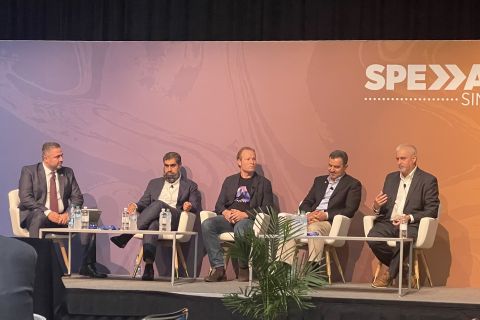President Joe Biden's administration has asked U.S. energy companies to prepare affidavits documenting how Mexico’s protectionist policies disrupted their investments as Washington prepares to escalate a trade dispute with its neighbor, according to three people familiar with the discussions.
The request for affidavits from major U.S. oil and renewable energy companies represents the latest and clearest signal that the Office of the United States Trade Representative (USTR) plans to seek an independent dispute settlement panel under the United States Mexico Canada Agreement trade pact, or USMCA.
Mexico President Andres Manuel Lopez Obrador's steps to roll back reforms aimed at opening Mexico's power and oil markets to foreign competitors ultimately sparked the trade dispute.
U.S. energy and power companies, such as Chevron(CVX.N) and Marathon Petroleum (MPC.N), which sought to expand in Mexico, have complained that they have been denied simple permits and applications in decisions that favored state oil company Petroleos Mexicanos (Pemex) and national power utility Comision Federal de Electricidad (CFE).
The United States is likely to seek a dispute panel before the end of the year if talks on the issue continue to stall, and the affidavits represent evidence that would be included in the panel request, the sources said. If that panel rules against Mexico and it fails to take corrective action, Washington could ultimately impose billions of dollars in retaliatory tariffs on Mexican goods.
The people asked not to be named because they are not authorized to speak publicly on the matter.
The steps add to a significant worsening of trade relations between Washington and Mexico City, even as their economic integration grows. In August, USTR requested a USMCA dispute settlement panel to intervene in a disagreement over Mexico's curbs on genetically modified corn imports. Mexico now buys about $5 billion worth of U.S. GM corn annually, mostly for livestock feed.
Like the energy policies, Washington argues that banning GMO corn for human and animal consumption violates Mexico's obligations under the trade pact.
Obrador is seen as a major obstacle to resolving both disputes since he sees energy and corn as important to Mexico’s national identity.
A USTR spokesperson declined to comment.
Mexico’s Economy Ministry, in response to a Reuters request for comment, said it had no information regarding the matter.
The White House has hoped to avoid escalating energy trade tensions with Mexico as it sought help on immigration and drug trafficking, but talks that began last year have made little progress. Raising the stakes in the dispute carries significant risk for Biden, who will face Republican criticism over his handling of immigration and drug trafficking as he seeks reelection in 2024.
Mexico overtook Canada and China to become the largest U.S. goods trading partner in the first half of 2023, reaching total trade of $396.6 billion for the period as Mexico's automotive production grows and other U.S. companies shift supply chains from China closer to home.
In 2022, Mexico had a $130.5 billion goods trade surplus with the United States. It is on track to more than double from the $69 billion surplus in 2017, when former President Donald Trump launched a renegotiation of NAFTA after threatening to quit the pact, claiming it was draining U.S. manufacturing jobs.
Dispute panel
By seeking a dispute settlement panel, USTR would be essentially giving up negotiations, turning instead to a form of litigation created in the 2020 revamp of the former North American Free Trade Agreement.
Under USMCA's dispute settlement rules, a five-person panel, chosen from a roster of pre-approved experts, must be convened within 30 days, with a chair jointly chosen and the U.S. side choosing two Mexican panelists and Mexico choosing two American panelists. The panel will review testimony and written submissions and its initial report is due 150 days after the panel is convened.
Last year, one such panel ruled in Washington's favor in a dispute over Canadian dairy quotas, and against the U.S. on automotive rules of origin, siding with Mexico and Canada.
Recommended Reading
Adionics Unveils Lithium Extraction Technology For Recycled Batteries
2024-09-09 - The Paris-based company said its liquid-liquid process achieved lithium recoveries of up to 98% across a range of brine concentrations.
AI: Herald of New Shale Age or Last-ditch Effort to Save Industry?
2024-10-03 - AI’s ability to optimize may usher oil and gas into a new age—or simply improve on past unconventional recovery methods—depending on who you talk to.
Push-Button Fracs: AI Shaping Well Design, Longer Laterals
2024-11-26 - From horseshoe wells to longer laterals, NexTier, Halliburton and ChampionX are using artificial intelligence to automate drilling and optimize completions.
New Texas 30-MW Data Center Begins Construction
2024-11-11 - Dataprana’s 30-megawatt data center in La Marque, Texas will help satiate the growing demand for cloud services, Web3 applications and digital asset mining.
Companies Hop on Digital Twins, AI Trends to Transform Day-to-day Processes
2024-10-23 - A big trend for oil and gas companies is applying AI and digital twin technology into everyday processes, said Kongsberg Digital's Yorinde Lokin-Knegtering at Gastech 2024.
Comments
Add new comment
This conversation is moderated according to Hart Energy community rules. Please read the rules before joining the discussion. If you’re experiencing any technical problems, please contact our customer care team.





